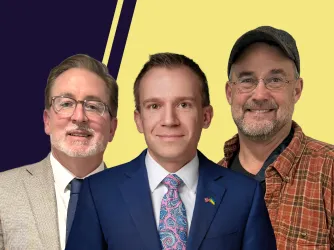Table of Contents
Why Florida’s betrayal of the First Amendment to ‘Stop WOKE’ should concern everyone, including conservatives

Shutterstock.com
Earlier this month, a federal court enjoined the higher education provisions of Florida’s “Stop WOKE Act,” holding that the “dystopian” law violated the First Amendment rights of faculty and students in the state’s public universities and colleges by promulgating a list of prohibited viewpoints. The court’s 139-page opinion was derided by some on the right, who argued the state can dictate what views may be expressed in its college classrooms.
Set aside, for the moment, that the Supreme Court has long held the First Amendment does not “tolerate laws that cast a pall of orthodoxy” over the college classroom. Florida would cut a great road through the First Amendment to stop “woke” ideas, eradicating one of the few legal defenses faculty members have — right, left, and otherwise — to defend themselves against overreach by administrators and lawmakers alike.

Novoa v. Diaz: Florida Board of Governors: Florida Law Restricting How College Professors, Students Can Discuss Race and Sex
FIRE filed a lawsuit challenging the higher education provisions of Florida’s Stop WOKE Act that impermissibly chill free expression and promote unconstitutional censorship on the state’s college campuses.
Florida’s arguments, if adopted, would leave faculty twisting in the wind whenever their academic speech offended a student, colleague, administrator, donor, or lawmaker. It’s not difficult to foresee how eroding these shields would imperil conservative faculty members, whose views are often in the minority on campus.
At the outset, it’s important to be clear about what FIRE’s case is not about. It’s not about K-12 schools — it’s about colleges and universities, where students learn through exposure to competing ideas. So far, the Supreme Court has extended little, if any, protection for teachers’ curricular speech in K-12 institutions, but broadly protects faculty in higher education. It is also not about Florida’s “Parental Rights in Education” law (dubbed the “Don’t Say Gay” law by its opponents). That’s a separate statute entirely.
We know from decades of Supreme Court decisions that government employees are entitled to some measure of First Amendment protection. When they speak as private citizens about issues important to the public, the First Amendment limits how their government employer may respond. That’s why the government can’t fire teachers who criticize their schools, police officers who criticize their departments, and utility employees whose personal social media comments offend others. And it’s what protects faculty members across the political spectrum whose speech outside the classroom — on social media, in newspaper opinion pieces, in faculty lounges, or in the public square — attracts the ire of students, colleagues, or administrators.
But what about academic speech? When a professor speaks in the classroom, in faculty meetings, and in academic publications, that speech is often pursuant to their job duties. For most government employees, the First Amendment doesn’t apply when they’re speaking for the government. But the Supreme Court decision making that point, Garcetti v. Ceballos, cautioned that it may not apply to one — and only one — group of professionals: faculty members in higher education. And every court of appeal that has since considered the question has ruled that faculty members’ academic speech is entitled to some degree of protection by the First Amendment.
Universities occupy a special place in our constitutional constellation, which recognizes that faculty are hired to speak from their expertise, not to convey the state’s own message.
That’s because universities occupy a special place in our constitutional constellation, which recognizes that faculty are hired to speak from their expertise, not to convey the state’s own message. States can’t pick winners and losers in the marketplace of ideas, and the Court has recognized that the college classroom is “peculiarly” that very marketplace.
That shield is what protects faculty against overreach by lawmakers, administrators, and institutions. It’s what protected “outspoken Christian and conservative” professor Mike Adams, who struck “the first major blow against the application of Garcetti to academic speech of college professors,” when his public university refused him a promotion to full professor after “colleagues, administrators, and donors had strongly negative reactions to Adams’ outspoken beliefs.” It protected an Arizona community college professor when a Muslim student complained that quiz questions about Islamic terrorism were “in distaste of Islam.” It’s what FIRE is relying on today to defend Stuart Reges, punished for including in a syllabus a statement criticizing the “land acknowledgment” the University of Washington wanted him to publish.
The First Amendment isn’t the only tool some faculty have to defend themselves. Some can rely on tenure as protection. Some can rely on colleagues or administrators who agree with their views, or who are principled enough to defend freedom of expression even when it’s exercised in ways they loathe. A scant few can rely on legislators to expend political capital on defending unpopular speech. And sometimes public pressure can be successfully applied, if faculty know to contact organizations like FIRE and are willing to mount a campaign in the court of public opinion, hoping the public will agree their speech — again, unpopular and controversial as it may be — should be heard.
But for some faculty, the First Amendment is the last line of defense. And it’s a defense not just against legislatures that overreach, but also administrators that implement policy and investigate complaints about faculty members by students or colleagues. If the First Amendment provided no barrier when faculty members’ speech angers students, faculty, or malcontents on social media, then administrators would appease the loudest voices by punishing the offending speaker.
The speech-suppressing rule you adopt today is the one your ideological opponents will deploy against you tomorrow.
Importantly, the court’s ruling in the Stop WOKE Act case does not mean state legislatures have no say in curricular choices. For example, a faculty member cannot compel a university to offer a new class. But it means, at least, that lawmakers cannot dictate the viewpoints expressed in the classes that universities otherwise offer.
Whatever concerns conservatives and allies have for the range of acceptable viewpoints in academia, censorship is not a solution. To the contrary, censorship will reinforce a censorial culture in academia. In fact, Florida’s argument echoes, if not repurposes, arguments deployed in service of censorious campus speech codes targeting “hate speech.”
As Conor Friedersdorf writes in The Atlantic, Florida’s arguments are clones of those advanced by some quarters of the left:
In fact, a striking passage in Florida’s legal brief opposing the preliminary injunction states, “Even if the First Amendment did apply here, Florida’s compelling interest in stamping out discrimination based on race and other immutable characteristics amply justifies any burden on speech the Act may impose.” The explicit defense of the bill is that fighting whatever politicians dub racism on campus is more important than the First Amendment.
If the DeSantis administration manages to set that precedent, we should rename the law the Enabling Wokeness Act. When David Bernstein lamented in his 2003 book, You Can’t Say That! The Growing Threat to Civil Liberties From Antidiscrimination Laws, that some professors would use the Fourteenth Amendment’s guarantee of equality under the law as a pretext to supersede the First Amendment, he was objecting to a prominent strand of critical race theory. How striking that people who claim to revile CRT are advancing the same logic.
So if Florida’s arguments carried the day, it’s not difficult to see how they will be utilized by left-leaning lawmakers and administrators to suppress speech. The standard response is that the right is simply applying the “new rules” that the left already set. That’s a zero-sum game that relies on selling out your own rights in order to obtain a momentary victory. The speech-suppressing rule you adopt today is the one your ideological opponents will deploy against you tomorrow. Those on the right and left would be wise to follow the advice of my colleague Joe Cohn, who put it succinctly, “Don’t fall in love with the club that will be used to beat you over the head.”
We at FIRE know that there’s one rule — the First Amendment. And we’ll defend it against any threats from any quarter.
FIRE defends the rights of students and faculty members — no matter their views — at public and private universities and colleges in the United States. If you are a student or a faculty member facing investigation or punishment for your speech, submit your case to FIRE today. If you’re faculty member at a public college or university, call the Faculty Legal Defense Fund 24-hour hotline at 254-500-FLDF (3533).
Recent Articles
Get the latest free speech news and analysis from FIRE.

Free speech in Trump 2.0
Podcast

The Federal Bureau of Investigation (of protected speech)

The paper was her lifeboat — UMD called it interference


